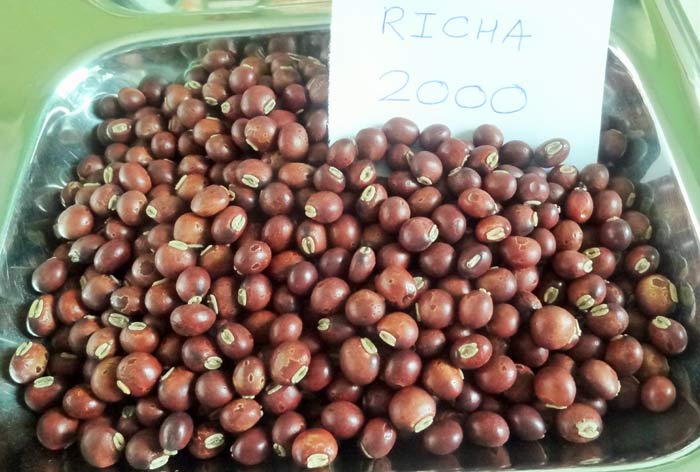Name : Rajkumar Rathor
District & State : Sehore, Madhya Pradesh
Category : Agricultural (General)
Award : Consolation
Award Function : 4th National Grassroots Innovation Awards
Award Year : 2007
Innovation Description
- Award Status
- IPR Status
- Salient Features
Background
 Raj Kumar Rathore (40) is a progressive farmer who has developed a perennial pigeon pea variety having a bushy growth and good yield. He is the eldest of the six siblings: three brothers and sisters. He is an arts graduate and lives with his wife son and daughter. Wheat is the main crop grown in the area followed by pigeon pea and soya bean. Earlier, sugar cane was widely grown here but after the only sugar mill closed down, people switched over to other crops. He studied in a village school. Since his father?s farm was near, he sometimes used to work on the land and help his father. As a child, he used to like pigeon pea fields and was always interested in its cultivation. His father also had an innovative bent of mind. He also used to experiment a lot in his field. Like every child, Rathore also used to play with a number of things; make and break articles. Since he used to see agricultural activities around him, he generally used to make related things for e.g. a tractor model from matchboxes, plough using matchstick amongst others. He has eighteen acres of land; he grows wheat and soyabean on fifteen acres, on another two acres is his horticulture garden where he grows mango, strawberry, litchi, etc. and one the remaining one acre he ?makes? pigeon pea seeds. His logic for allotting only one acre to seed production is that it would not be possible for him to maintain the quality and purity of the seeds on a larger area.
Raj Kumar Rathore (40) is a progressive farmer who has developed a perennial pigeon pea variety having a bushy growth and good yield. He is the eldest of the six siblings: three brothers and sisters. He is an arts graduate and lives with his wife son and daughter. Wheat is the main crop grown in the area followed by pigeon pea and soya bean. Earlier, sugar cane was widely grown here but after the only sugar mill closed down, people switched over to other crops. He studied in a village school. Since his father?s farm was near, he sometimes used to work on the land and help his father. As a child, he used to like pigeon pea fields and was always interested in its cultivation. His father also had an innovative bent of mind. He also used to experiment a lot in his field. Like every child, Rathore also used to play with a number of things; make and break articles. Since he used to see agricultural activities around him, he generally used to make related things for e.g. a tractor model from matchboxes, plough using matchstick amongst others. He has eighteen acres of land; he grows wheat and soyabean on fifteen acres, on another two acres is his horticulture garden where he grows mango, strawberry, litchi, etc. and one the remaining one acre he ?makes? pigeon pea seeds. His logic for allotting only one acre to seed production is that it would not be possible for him to maintain the quality and purity of the seeds on a larger area.
Genesis
In 1997, he chanced upon a different plant in his field of ICPL-87. This unusual plant drew his attention whenever moved around in the field. It had bigger flowers that had two colours; its leaves were long and the plant remained green for a longer duration. Further its pods grew at the top and in bunches.Noticing the feature he thought if he was able to increase the pod bearing and number of branches in the plant the yield can be improved. Based on this thought, he harvested the plant separately for sowing it in the next season. Seed harvested from the selected plant were sown in isolation the next year, to observe the growth and the various characters, which fascinated the farmer. He observed that the plants bore very few branches and hence tried out many things like using growth promoters available in the market to increase the number of branches. But, he did not achieve any significant success. Then he tried cutting the top a day prior weeding to facilitate better growth, to restrict further vegetative growth and enhance branching. Six branches emerged as a result.He repeated the practice of clipping/topping twice (45 and 90 DAS) and observed that total of 12-14 branches emerged from the plant. He repeated this for three crop seasons thereby standardizing the technique and multiplying seeds to a sufficient number by 2000. He submitted some seeds for trial to IFFCO, Bhopal and also sent them to various farmers in 5-6 states. Once he took his seeds to RAK Agriculture College, Sehore in 2000 but the scientists there ridiculed and discouraged him. Though they did not want to help him in any way, they still tried to contact him many times to coerce him into giving up his seeds to them. They told him that he would not be able to release the seeds and only they could do it, and so he should be wise to give it to them. But one his well-wishers suggested that he send the seeds to ICAR, Delhi in 2000. He did, but he had still not got any reply in 2006. In 2002 he also sent some seeds to Banasthali Vidyapeeth, Rajasthan, and got no response from there either. However, he has been getting very encouraging feedback from farmers wherever he has sent the seeds. His wife has always been a source an inspiration and pillar of support throughout. Other family members asked him not to waste time unnecessarily as they were a skeptical about the success of his endeavour. Dr SP Shukla IFFCO helped and encouraged him a lot. One of his cousins and her husband in Bhopal always supported and motivated him. Today his children are also helping him in his work. They help in packing and forwarding of the seeds to the customers. His wife helps in handling seed inquiries, packaging and forwarding of the items and maintaining the records. He has also incurred losses as people often used to take seeds without paying him money.He has started an agricultural equipment shop in his home where he sells sprayers, pumps, pipes etc and even plans to display selected NIF technologies in his shop. He also wants to help NIF in generating more entries by being a scout and bringing to the front more innovators like him. He has sent a weed removal attachment using motorcycle as an entry to NIF. He was invited by NIF to be part of the member of the panel of informal experts in May 2006. He also participated in the Shodhyatra in Uttar Pradesh in during December 2006-January 2007.
http://nif.org.in/innovation/Richa_2000_perennial_pigeon_pea_variety/360
